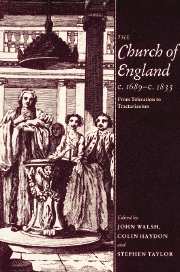Book contents
- Frontmatter
- Contents
- Preface
- List of Abbreviations
- 1 Introduction: The Church and Anglicanism in the ‘long’ eighteenth century
- Part I The pastoral work of the Church
- Part II Crisis and reform
- 5 The Church, the societies and the moral revolution of 1688
- 6 John Locke, Jonas Proast and religious toleration 1688–1692
- 7 The origins and ideals of the SPCK 1699–1716
- 8 Cultural patronage and the Anglican crisis: Bristol c. 1689–1775
- 9 Latitudinarianism at the parting of the ways: a suggestion
- 10 Ecclesiastical policy under Lord North
- 11 The foundation of the Church Missionary Society: the Anglican missionary impulse
- 12 A Hanoverian legacy? Diocesan reform in the Church of England c. 1800–1833
- Part III Identities and perceptions
- Index
7 - The origins and ideals of the SPCK 1699–1716
Published online by Cambridge University Press: 13 October 2009
- Frontmatter
- Contents
- Preface
- List of Abbreviations
- 1 Introduction: The Church and Anglicanism in the ‘long’ eighteenth century
- Part I The pastoral work of the Church
- Part II Crisis and reform
- 5 The Church, the societies and the moral revolution of 1688
- 6 John Locke, Jonas Proast and religious toleration 1688–1692
- 7 The origins and ideals of the SPCK 1699–1716
- 8 Cultural patronage and the Anglican crisis: Bristol c. 1689–1775
- 9 Latitudinarianism at the parting of the ways: a suggestion
- 10 Ecclesiastical policy under Lord North
- 11 The foundation of the Church Missionary Society: the Anglican missionary impulse
- 12 A Hanoverian legacy? Diocesan reform in the Church of England c. 1800–1833
- Part III Identities and perceptions
- Index
Summary
On 8 March 1699 Dr Thomas Bray and three of his acquaintances met in the Lincoln's Inn rooms of one of their number, the barrister John Hooke, and formed themselves into the Society for Promoting Christian Knowledge. Thus was established the foremost voluntary society within the Church of England. While there has been much writing on the early years of the SPCK, there has been little detailed analysis of the ideals which coloured its work. This essay seeks to remedy this deficiency through an analysis which draws not only upon the SPCK's copious records, but also upon the theological and devotional works of leading SPCK members, Thomas Bray and Robert Nelson. An examination of their much-neglected works makes it possible to reconstruct the ideal of evangelical philanthropy, which was central to the early work of the SPCK. But this essay will also attempt to set the Society in a broader political and religious context. We shall begin with a review of the political complexion of the SPCK's membership.
Within two years of its foundation, the membership of the SPCK had grown to some ninety Subscribing or Resident members. Subscribing members were admitted to the Society only upon the recommendation of an existing member, and were based for at least part of the year in London. As their title suggests, they paid an annual subscription and enjoyed voting rights at Society meetings. The SPCK also had many Corresponding members dotted throughout the country.
- Type
- Chapter
- Information
- The Church of England c.1689–c.1833From Toleration to Tractarianism, pp. 172 - 190Publisher: Cambridge University PressPrint publication year: 1993
- 6
- Cited by



